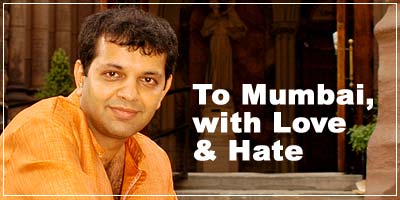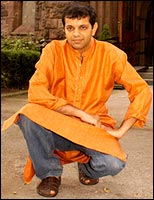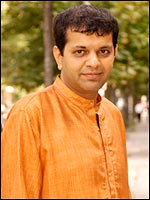
For someone who describes Bal Thackeray as "the one man most directly responsible for ruining the city I grew up in," Suketu Mehta sips his white wine with surprising equanimity.
It is 11 pm at Olive, a popular nightspot in Mumbai where the rich and famous gather to do what the rich and famous do best. A party has been thrown to celebrate the publication of Mehta's first book, Maximum City: Bombay Lost And Found. Around me stroll the usual suspects -- pseudo intellectuals, largely illiterate socialites, a couple of bad actors. Half of them don't know what the occasion is. The others believe it has something to do with a book.
What with some people either trying to kiss him or introduce him to friends and family, getting Mehta to talk is a difficult task.
 I try nonetheless, holding him gently by the elbow, referring to the comment in question and asking him if he is worried about what it could do.
I try nonetheless, holding him gently by the elbow, referring to the comment in question and asking him if he is worried about what it could do.
"I'm not," he says. "I did my research, and put out the facts. It was a lot of work. I met a lot of people. With reference to that particular passage, I wanted to concentrate more on what goes into the making of a rioter."
To his credit, even a cursory glance through the book reveals a whole lot of research. It is a well-written piece of investigative reporting, and those who've read it have been lavish with their praise. Jhumpa Lahiri, for instance, believes it is 'one of the most intimate and moving portraits of a place' she has read. Nell Freudenberger refers to Mehta as 'the best kind of investigative reporter,' while Amitav Ghosh calls it a 'gripping, compellingly readable account of a love affair with a city.'
I remind Mehta of the fairly recent controversy over American historian James Laine's book, Shivaji -- A Hindu King in Islamic India. In January, the Nationalist Congress Party-dominated Maharashtra government came down heavily on the author. An institute was ransacked, invaluable artefacts were destroyed, and the book was promptly banned. Mehta shrugs. "That was a different issue," he says. "All I have done is try and talk about what makes this city what it is. The question of riots shouldn't even occur."
Maybe it won't. After all, there's enough to entice readers even without any references to the Sena chief. Mehta ushers in a whole host of characters, from Shiv Sena members who boast of killing Muslims in the 1992 riots, to hit men, a bar girl called Monalisa, senior police officers, cross-dressing male dancers, aging film stars, and even a Gujarati multimillionaire who gives up his fabulous wealth in order to take up religion.
"Do these people really exist?" I ask. Mehta laughs. "No, I made them all up," he says, sarcastically. "Of course they exist! Even the multimillionaire does. I happen to be Gujarati. I know these people. They give it all up and leave. It sounds unbelievable simply because you haven't seen it. But that doesn't mean these things and these people don't exist, does it?"
Why focus only on the 'morally compromised,' I ask. What about the rest -- people like the ones currently surrounding the two of us at Olive. Don't they epitomise Mumbai just as well? "I have spoken of a lot of everyday people too," says Mehta. "There are all kinds of people that go into the making of a city. Why focus only on the more colourful ones in the book?"
 Coming as he has after a 21-year absence, Mehta has the luxury of an outsider's eyes. Born in Kolkata, he lived in Mumbai for nine years before moving to New York. A graduate of NYU and the Iowa Writers' Workshop, he went on to write for the New York Times Magazine, Granta, Time and The Village Voice, picking up a number of awards along the way. And yes, he also co-wrote Mission Kashmir.
Coming as he has after a 21-year absence, Mehta has the luxury of an outsider's eyes. Born in Kolkata, he lived in Mumbai for nine years before moving to New York. A graduate of NYU and the Iowa Writers' Workshop, he went on to write for the New York Times Magazine, Granta, Time and The Village Voice, picking up a number of awards along the way. And yes, he also co-wrote Mission Kashmir.
What reviewers have found appealing about his book is its ability to empathise and play the role of detached observer with equal poise. Mehta may rave and rant about the bureaucracy, they point out, but he still maintains faith in Indian democracy. In a fascinating study of Sonia Gandhi and her appeal to the nation's poor, he makes an interesting comment: 'This is the biggest difference between the world's two largest democracies. In India, the poor vote.'
Now that this project -- and a tiring one it must have been -- is over and done with, I ask Mehta about his next, a novel titled Alphabet. "It is told from the point of view of a foetus," he says, and clams up. I also ask about the original screenplay he's been working on for The Goddess, a Merchant-Ivory film starring Tina Turner. "It's going pretty well," he replies. "I have a first draft, and I have been hanging out with Tina a lot."
The evening draws to a close. Mehta is swallowed by newer entrants. There are filmmakers and journalists, models in branded wear, a few gay men in kitschy clothing. Alcohol flows, and hors d'oeuvres make the rounds. Standing quietly in a corner, I open the book these people are here to celebrate, and read: 'Next year, Bombay's population will top 27.5 million (greater than the continent of Australia's); by 2014, it is likely to outrank Tokyo as the world's most populated urban area. Bombay is the future of urban civilization on the planet. God help us.'
It's 1 am. All around me, the people of Mumbai party on. There is more alcohol, more chatter, more artificial displays of affection. Maybe the city is just too afraid to sleep.
Photographs: Paresh Gandhi
Image: Uday Kuckian





